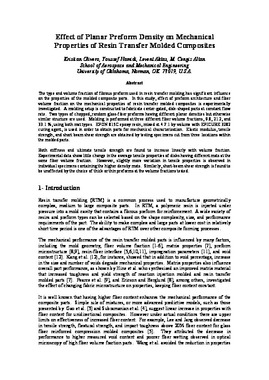Effect of Planar Preform Density on Properties of Resin Transfer Molded Composites
Abstract
The type and volume fraction of fibrous preform used in resin transfer molding has significant influence on the properties of the molded composite parts. In this study, effect of preform architecture and fiber volume fraction on the mechanical properties of resin transfer molded composites is experimentally investigated. A molding setup is constructed to fabricate center-gated, disk-shaped parts at constant flow rate. Two types of chopped, random glass-fiber preforms having different planar densities but otherwise similar structure are used. Molding is performed at three different fiber volume fractions, 9.8, 21.2, and 33.1 %, using both mat types. EPON 815C epoxy resin, mixed at 4.7:1 by volume with EPICURE 3282 curing agent, is used in order to obtain parts for mechanical characterization. Elastic modulus, tensile strength, and short beam shear strength are obtained by testing specimens cut from three locations within the molded parts.
Both stiffness and ultimate tensile strength are found to increase linearly with volume fraction. Experimental data show little change in the average tensile properties of disks having different mats at the same fiber volume fraction. However, slightly more variation in tensile properties is observed in individual specimens containing the higher density mats. Similarly, short-beam shear strength is found to be unaffected by the choice of thick or thin preforms at the volume fractions tested.
Citation
Olivero, K., Hamidi, Y., Aktas, L and Altan, M. C. Effect of Planar Preform Density on Properties of Resin Transfer Molded Composites, Presented at the 18th International Conference of the Polymer Processing Society. Article # 402, 2002.
